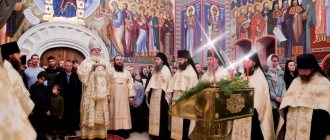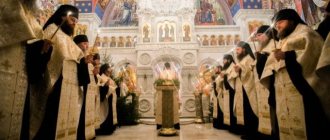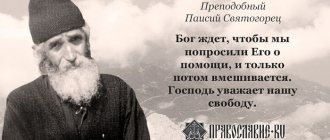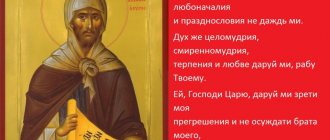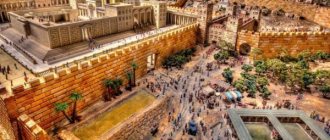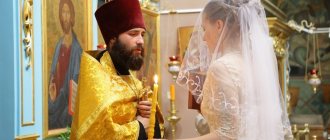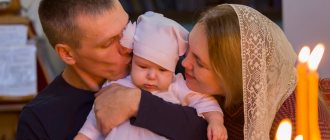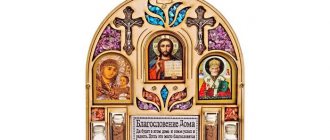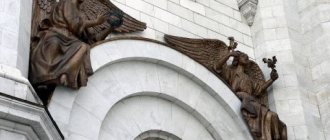Brief history of the battle on the Kulikovo field
The victory on the Vozha River inflamed Mamai’s rage even more. Seeing the pitiful remnants of the army of Temnik Begich, whom the Russians pursued until darkness and mercilessly flogged and hacked, Mamai became convinced that Moscow should be ravaged and burned to the ground. The campaign against Rus' was also necessary to strengthen the power of the khan, which was shaken due to the shameful flight of the Tatars from the Vozha River. In the Golden Horde, the influence of Tokhtamysh, the legal heir of Ulus-Juchi, a descendant of the eldest son of Genghis Khan, grew.
In the summer of 1380, terrible news came to Moscow. Prince Dmitry was informed that Temnik Mamai, having gathered a great army, was going to war against Rus' in order to forever eradicate the Russian princes, install his Baskaks in their place, and replace the Christian faith with Islam. Scouts reported that Mamaev's hordes crossed to the right bank of the Don and set up camps at the mouth of the Voronezh River, not far from the Grand Duchy of Ryazan.
Having made a prayer, Dmitry Ivanovich sent messengers to all ends of the Russian land with the command that his governors and governors gather military men. He asked for help from neighboring principalities; Vladimir Andreevich, Prince of Serpukhov, was the first to respond to the call. He and his squad set out for Moscow. Peasants who only knew how to plow and sow also went to war. For them, armor, swords, shields, and axes were hastily forged. Experienced warriors taught recruits the basics of martial art.
Inspired by the victory on Vozha, Russian soldiers marched against the godless Tatars, sacredly believing in the help of the Lord. They had to defend not only their homeland, but also their religion. Before the campaign, Prince Dmitry, together with his squad, boyars and surrounding princes, went to the monastery of the Life-Giving Trinity to receive a blessing from the holy elder Sergius.
Who is Sergius of Radonezh
After the abandonment of paganism and the adoption of the Christian Orthodox faith, religious ascetics began to appear in Rus'. These were deeply religious people who completely broke with worldly concerns and devoted themselves to serving God. They not only contributed to the strengthening of faith, but also engaged in educational activities.
Church chronicles contain descriptions of many miracles that these people performed. Here are the exorcism of demons, the healing of the sick, as well as predictions of the future that came true. One of the most famous ascetics was Abbot Sergius of Radonezh.
early years
The parents of the future saint were Rostov boyars. Little is known about the family of Sergius of Radonezh. They were quite noble people, but they lived quietly and with dignity. The father's name was Kirill, and the mother's name was Maria.
Interesting: Kirill repeatedly had to accompany the Rostov princes to the Horde, but he did not receive any ranks from his service.
When a boy was born into the family, he was baptized with the name Bartholomew. The month of birth is known for sure - it is May, but the year of birth, in different sources, is called 1314, 1319 and even 1322. The boy has a brother named Stefan. When the children grew up, they were sent to learn literacy and writing. Stefan did well and studied diligently, but Bartholomew was not good at science.
Everything changed by an incident that is perceived as a miracle. The boy Bartholomew met a venerable old man in the forest, to whom he complained about his failures in science. The elder prayed and gave the youth a piece of prosphora to eat. Then the two of them went home to Kirill and Maria. After the meal, the elder ordered the young man to read the psalter. He tried to refuse, citing inability, but the elder ordered again. When Bartholomew began to read, everyone was amazed at how well, cleanly and quickly he read.
Interesting: Now you will know reading and writing and other sciences better than anyone, the elder said and left. No one ever saw him again.
After this event, the boy changed a lot. He began to do things that greatly frightened his mother:
- For a week I ate only bread and water.
- On Wednesday and Friday I did not consume food.
- I could kneel and pray to the Lord all night.
Bartholomew told his parents that he wanted to devote his life to serving God. They did not dissuade him, but asked him to wait until they died. The young man stayed with them and looked after them until the very end.
Forest Hermitage
After the death of his parents, the young man went to a monastery, where his brother Stefan was a monk. Having persuaded him to renounce worldly vanity, Bartholomew went with him to the thicket of the Radonezh forest, where with his own hands he built a small Church of the Holy Trinity and a simple dwelling. The difficult lifestyle in the wilderness frightened Brother Stefan, and he left the monastery.
Interesting: Bartholomew did not persuade his brother to stay, because as a child he had a vision that he was living all alone in a deep forest.
In the future, he will become abbot of the Moscow Epiphany Monastery. Left completely alone, Bartholomew asks Abbot Mitrofan to visit him, from whom he takes monastic vows under the name Sergius. The abbot also gave his blessing for desert life. This event occurred when the young man was twenty-three years old.
Founding of the monastery
Sergius of Radonezh lived in a deep forest and in complete solitude for several years. According to a well-known legend, he saved a dying bear from starvation, after which they became best friends. Gradually, rumors about the hermit monk spread throughout the surrounding area and people flocked to the forest monastery, asking to be accepted into the monastery.
Sergius dissuaded, citing the hardships and deprivations of forest life, but the flow of those wishing to do so did not stop. One and a half dozen cells were built, and the monastery was surrounded by a strong fence made of logs for protection from wild animals. The new novices did their own carpentry, uprooted stumps and grew grains and vegetables in a small garden.
Interesting: Despite the very difficult living conditions, no one wanted to leave the monastery. Contemporaries noted the feeling of lightness and goodness that enveloped everyone who arrived at the forest monastery.
Several years have passed. The small monastery gradually turned into a real forest monastery. The brethren wished for Sergius to assume the rank of abbot. He refused for a long time, saying that it was better for him to learn than to teach and better to obey than to rule. But the monks continued to insist and Sergius gave in.
To receive rank one should have applied to the Metropolitan of Moscow, but since he was away, Sergius and the senior monks went to the highest saint, who was replacing the metropolitan. Bishop Athanasius held the appropriate church service and elevated Sergius of Radonezh to the rank of abbot. Despite his high church position, Father Sergius did not disdain any kind of work.
At the monastery he did the following:
- Rolled wax for candles
- Cooked kutya and made prosphora
- Made wooden furniture
- Sewed clothes and shoes
Gradually, gifts and funds began to arrive at the monastery. All this was donated to the forest monastery by rich boyars who heard about the forest monastery, and clergy from city churches and monasteries. This made it possible to build a new large church. The number of novices was constantly growing. The cells began to be arranged in the correct order, creating a semblance of streets.
Hegumen Sergius did not immediately conduct the rite of tonsure of the new arrivals. For some time he observed everyone who wanted to become a monk and stay in the monastery. Some were categorically refused and had to leave the monastery.
The monastery expanded, and gradually it acquired arable land that needed to be cultivated. Roads were laid and a guest house was built, where it was not shameful for not only the noble boyar, but also the Grand Duke to stay. Metropolitan Alexy became a frequent visitor to the forest monastery. This added even more respect and respect to the activities of Sergius of Radonezh.
Trip to the Trinity Monastery
The revered Sergius of Radonezh was the godfather of Dmitry Ivanovich’s two children. He repeatedly instructed the prince, conducting godly conversations with him. On the eve of the terrible massacre, the Moscow ruler simply could not help but visit him and ask for advice and blessings.
Having defended the Liturgy and shared a meal with the holy elder, Dmitry knelt down and asked Sergius to bless him. Having sprinkled the prince and his army with holy water, the abbot said: “Go, sir, fearlessly.” The Lord will help you against your godless enemies! Leaning towards Dmitry, he barely audibly whispered: “You will defeat your enemies!”
The news of Sergius' blessing quickly spread throughout Rus'. Both the princes’ henchmen and the common people stood under the banner of Dmitry Ivanovich. The rulers, doubting the correctness of their choice, after a visit to the Trinity Monastery, without hesitation, followed the Moscow prince.
Mamai doesn't want war?
Contrary to popular belief, the reasons for the clash between Russia and the Horde lay not only in the area of cultural and political contradictions. Since the Mongol conquests, Rus' has paid tribute to the Horde. In the 70s of the 14th century, the flow of silver from the Moscow principality dried up. Mamai demanded money, but could not receive anything owed from Moscow.
Dmitry Donskoy had the money to stop paying tribute to Mamai. epidemiological reasons. At the beginning of the decade, the Horde was hit by one of the waves of the 14th century pandemic - the plague. Rus' was spared the craze. The situation made it possible to reconsider the balance of forces.
Mamai tried to make peace with Moscow by receiving the Muscovite candidate Mikhail at his residence. And he took steps towards an independent principality in Tver, hoping to direct it against Moscow. However, he was unable to restore the established flow of money from Rus' through diplomatic means.
Warrior monks
Monks were forbidden to participate in hostilities under threat of excommunication, but St. Sergius made an exception and blessed two schema-monks from a boyar family who volunteered for battle. In those days, many great warriors took monastic vows at a certain point in their lives, thereby renouncing worldly life, “dying to the world.” They tried to atone for the sins they had committed on the battlefield and were preparing to enter the Kingdom of Heaven.
According to the “Tale of the Massacre of Mamaev,” Sergius of Radonezh sent Alexander Peresvet and Andrei Oslyabya with Dmitry. Peresvet, known in the world as Alexander, was a Bryansk boyar and took part in many battles. According to one version, he took monastic vows at the Rostov Boris and Gleb Monastery, but for what reason - history is silent. Andrei Oslyabya was a fellow countryman of Peresvet, a boyar and a professional military man.
Sergius of Radonezh blessed the monastic warriors with the holy cross: “And he gave them, instead of perishable weapons, an incorruptible one - the cross of Christ, embroidered on the schemas, and commanded them to place it on themselves instead of gilded helmets.”
Mamai was not a usurper
Another popular misunderstanding related to the Kulikovo field has to do with Mamai: the Horde is considered one of the thieves of the throne with the following conclusion: the temnik was allegedly overthrown during a protracted, but at the same time fair, struggle for power. The role and significance of Dmitry Donskoy with this approach changes radically: from a rebel or fighter for national liberation, he turns into a figure on the scale of the Great Steppe, who tried not to isolate himself, but, on the contrary, to restore order in a country torn apart by unrest - his homeland, the Golden Horde.
In reality, there is no reason to see Mamai in such a dark light. Having no rights to the throne, although he owned it de facto, he observed dynastic law de jure, keeping young and dependent “khans” with him. From this side, the loss he suffered on the Kulikovo field was irreparable. After the Russian attack, Khan Muhammad lost his life, who should not have participated in the battle, since he performed a completely different function: he was present to embody legitimate power. Mamai had no other descendants of Genghis Khan at hand. Having fled to the steppe, the commander was faced with a loss of legitimacy, and the previously loyal Tyumens began to migrate from him.
Duel between Peresvet and Chelubey
According to the custom of those times, the battle began with a duel, the outcome of which supposedly foreshadowed the outcome of the entire battle. Chelubey, a mercenary with remarkable physical strength and a unique fighting technique, came from Mamai’s side. Peresvet, the same monk from the monastery of Sergius of Radonezh, volunteered from the Russians. According to the chronicle, the opponents rushed at each other with spears at the ready and collided with such force that the horses under them knelt and both riders fell dead.
According to another version, Chelubey wanted to defeat the Russian hero by meanness and armed himself with a spear much longer than usual. In this form, no enemy could reach him - he simply knocked him out of the saddle. Peresvet knew about the trick. He took off all the armor and left only the schema with a cross embroidered on it. During the duel, Chelubey easily and at high speed pierced the body of the Russian warrior, but Peresvet remained in the saddle, was able to reach the atheist and killed him with a blow from his spear. A faithful horse carried the rider to the Russian line, where he died.
Andrei Oslyabya also died in the Battle of Kulikovo. The bodies of the heroes were taken to Moscow and buried in the Church of the Nativity of the Blessed Virgin Mary in Simonova Sloboda. They were later canonized as saints.
Not the Tatar army?
When the troops of Dmitry Donskoy and his allies approached the Kulikovo field, noticeable but scattered forces opposed them. Mamai had at his disposal nine Tyumens - with a potential population of 10 thousand people. But after the epidemic, the steppes did not provide recruitment. Mamai was forced to turn to foreigners for help. Therefore, not only the Turks came out against the Russians on the Kulikovo field, but along with them - the Genoese mercenaries (and possibly other Italians and Western Europeans), the Circassians of the North Caucasus and the Armenians. These forces were not suitable for a protracted conflict. Military professionals held back Dmitry's first blow, but fled, leaving Mamai when fresh Russian forces arrived.
Later, the legend about the Kulikovo field was born. The word “fryag” mentioned in the sources had several meanings, one of which was “resident of Genoa.” In Eurasianist circles, the idea of Mamai as a ruler who tried to build a bridge between East and West became established. The Horde allegedly acted as an ally of the Catholic powers, who hoped to take control of ancient Russian exports. Even the Pope was called a participant in the intrigue.
All this is extremely doubtful. According to the 15th century source “Charter for the Genoese colonies on the Black Sea”, the trading republic had only tens, at best hundreds of soldiers on site, to whom Mamai could turn in a hurry. There is no reason to believe that he would have received consent to send them all: the Republic would hardly have exposed its rear, no matter how it treated the Horde.
Another thing is more likely: the word “fryag” among the ancient Russian authors who wrote about the Kulikovo field had a broader meaning - Italian, including Neapolitans, and even anyone from Western Europe. But what routes these people took to the steppe remains unclear.
